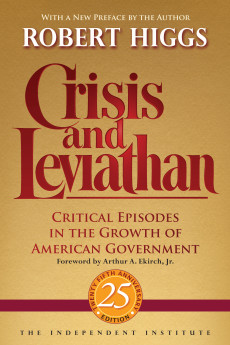Abigail R. Hall • Friday, April 8, 2016 •
By Christopher J. Coyne and Abigail R. Hall Blanco
 One of the greatest threats to freedom is indifference by those who possess it. In the aftermath of shootings, terror attacks, wars, and other unsettling geopolitical events, the political elite frequently confronts citizens with a supposed tradeoff between liberty and “safety”. Citizens are told that government can protect them, but only if they relinquish some of their freedoms and liberties to government.
One of the greatest threats to freedom is indifference by those who possess it. In the aftermath of shootings, terror attacks, wars, and other unsettling geopolitical events, the political elite frequently confronts citizens with a supposed tradeoff between liberty and “safety”. Citizens are told that government can protect them, but only if they relinquish some of their freedoms and liberties to government.
The period following the September 11 attacks on the United States is only the latest illustration of this dynamic. The scope of government power has increased on a variety of margins including surveillance, detainment, and the transnational drone war that includes extrajudicial killing. For many, the supposed security-liberty tradeoff is an easy choice. We have all heard someone say, “I have nothing to hide,” implying they have nothing to fear from expanded government intrusions into their lives.
This reasoning is wrongheaded on a number of margins. Perhaps the most important is that it poses a significant threat to the maintenance of individual liberties and freedoms, which proponents of increased government security purport to protect. As Nobel Laureate F.A. Hayek argued, in times of national emergency, principles must trump political expediency. The temptation to respond quickly, Hayek warned, risks undermining the very principles of a free society that government policies purport to protect.
The preservation of a free system is so difficult precisely because it requires a constant rejection of measure which appear to be required to secure particular results, on no stronger grounds than that they conflict with a general rule [a steadfast commitment to individual liberty], and frequently without our knowing what will be the costs of not observing the rule in the particular instance.
John R. Graham • Thursday, April 7, 2016 •
 An advocate of consumer-driven health care will often be challenged by this question: “So, when I am hit by a bus, or have a heart attack or stroke, or am suffering from dementia, you want me to go shopping around for medical care?”
An advocate of consumer-driven health care will often be challenged by this question: “So, when I am hit by a bus, or have a heart attack or stroke, or am suffering from dementia, you want me to go shopping around for medical care?”
Obviously not. Nevertheless, this is a serious challenge and invites the question: How much of our health spending can be meaningfully controlled by discriminating patients? Researchers at the Health Care Cost Institute (HCCI) recently addressed this. The HCCI has a unique advantage in producing such research, because it has access to a database of claims for employer-based plans run by a number of insurers.
The research categorized “shoppable” versus “non-shoppable” services. It found:
- At most, 43 percent of the $524.2 billion spent on health care by individuals with employer-sponsored insurance in 2011 was spent on shoppable services.
- About 15 percent of total spending in 2011 was spent by consumers out-of-pocket.
- $37.7 billion (7 percent of total spending) of the out-of-pocket spending in 2011 was on shoppable services.
John R. Graham • Thursday, April 7, 2016 •
 The Centers for Medicare & Medicare Services has announced that Medicare (that is, taxpayers) will pay for lifestyle-intervention program that prevents type 2 diabetes:
The Centers for Medicare & Medicare Services has announced that Medicare (that is, taxpayers) will pay for lifestyle-intervention program that prevents type 2 diabetes:
In 2011, through funding provided by the Affordable Care Act, CMS awarded the National Council of Young Men’s Christian Associations of the United States of America (Y-USA) more than $11.8 million to enroll eligible Medicare beneficiaries at high risk for diabetes in a program that could decrease their risk for developing serious diabetes-related illnesses. Beneficiaries in the program attended weekly meetings with a lifestyle coach who trained participants in strategies for long-term dietary change, increased physical activity, and behavior changes to control their weight and decrease their risk of type 2 diabetes. After the initial weekly training sessions, participants could attend monthly follow-up meetings to help maintain healthy behaviors. The main goal of the program was to improve participants’ health through improved nutrition and physical activity, targeting at least a five percent weight loss for each individual.
The results of the Diabetes Prevention Program model are striking:
- Medicare beneficiaries enrolled in the program lost about five percent of their body weight, which is enough to substantially reduce the risk of future diabetes. Average weight loss was 4.73 percent of body weight for participants attending at least four weekly sessions. Participants who attended at least nine weekly sessions lost an average of 5.17 percent of their body weight.
- Over 80 percent of participants recruited attended at least four weekly sessions.
- When compared with similar beneficiaries not it the program, Medicare estimated savings of $2,650 for each enrollee in the Diabetes Prevention Program over a 15-month period, more than enough to cover the cost of the program.
Robert Higgs • Wednesday, April 6, 2016 •
 The success to date of Bernie Sanders’s campaign for the Democratic presidential nomination and the visible support for socialism on display among the U.S. public, especially among young adults, demonstrate once again the enduring vitality of economic nonsense and ideological folly. (Please note, however, that the foregoing statement should in no way be understood as an endorsement of anyone else seeking a major party’s presidential nomination. Every serious contender is a statist of some stripe.)
The success to date of Bernie Sanders’s campaign for the Democratic presidential nomination and the visible support for socialism on display among the U.S. public, especially among young adults, demonstrate once again the enduring vitality of economic nonsense and ideological folly. (Please note, however, that the foregoing statement should in no way be understood as an endorsement of anyone else seeking a major party’s presidential nomination. Every serious contender is a statist of some stripe.)
If sincere (as opposed to purely opportunistic) statism is anything, it is Frederic Bastiat’s broken window fallacy writ large. The visible accomplishments of the state are hailed to the heavens, but the opportunity costs of these accomplishments are ignored or pooh-poohed (e.g., taxes reaped from “the rich” are regarded not as genuine costs but as payback for the exploitation they allegedly used to get their wealth in the first place).
Statists, however, not only avert their eyes from opportunity costs in the form of sacrificed current goods and services. More important, they act as if their glorious state projects have no adverse dynamic consequences, including discouragement and suppression of technological changes, economic innovations, and capital investments that might otherwise have produced more rapid economic growth and a widely shared improvement in the standard of living. For the statist, tunnel vision focused on the state’s current, visible benefits is the only vision that counts. Such an optical deficiency well nigh guarantees that statism will produce destitution and ruin in the long run, as it has everywhere it has been pushed to its feasible limits (e.g., the Soviet Union, Maoist China, North Korea, Cuba and, most recently, Venezuela), regardless of the propaganda and coercion the state employs to obfuscate and deflect blame for what it has done.
Like Lord Keynes, statists do not stop to weigh opportunity costs especially when those costs take the form of sacrificed goods and services in the more remote future, when presumably all the statists will be dead. The trouble is that as one generation of statists dies off, another comes along to take its place. The childish wishful thinking of getting something for nothing seems impossible to discredit successfully among a large segment of the public.
Gary Galles • Monday, April 4, 2016 •
 As Americans move closer to November’s elections, the campaigns are gearing up to tell each of us how important it is to vote. One illustration is a recent Michael Barone article titled “A very few votes can make a big, big difference.”
As Americans move closer to November’s elections, the campaigns are gearing up to tell each of us how important it is to vote. One illustration is a recent Michael Barone article titled “A very few votes can make a big, big difference.”
Barone makes his point by citing several close elections. Most prominent was George W. Bush’s election win due to a 537-vote margin in Florida. He also offered several other examples, focusing on the current primary season, where vote differentials as small as 1,148 made a difference.
Unfortunately, when the closest election cited was decided by more than 500 votes, Barone’s conclusion that “a few votes can make a big difference” does not support the conclusion that your individual choice of whether to vote or who to vote for makes a big difference. In fact, it implies that your vote will make no difference in the outcome. The results will be the same, whether you voted for the winner, a loser, or no one. And that has some important implications.
It means that many of the “get out the vote” arguments American hear every four years are invalid.
“If you don’t vote, you don’t have a voice in government”: This claim is falsified by the fact that even casting your vote won’t give you an effective voice in government.
John R. Graham • Monday, April 4, 2016 •
 The Blue Cross and Blue Shield Association, which represents 36 Blue Cross and Blue Shield plans covering 105 million Americans, has just released a study of its members’ claims data in Obamacare exchanges 2014 and 2015. It confirms that Obamacare exchange enrollees are sicker and more expensive than enrollees in pre-Obamacare individual plans or employer-based plans. Here I quote four of the study’s findings:
The Blue Cross and Blue Shield Association, which represents 36 Blue Cross and Blue Shield plans covering 105 million Americans, has just released a study of its members’ claims data in Obamacare exchanges 2014 and 2015. It confirms that Obamacare exchange enrollees are sicker and more expensive than enrollees in pre-Obamacare individual plans or employer-based plans. Here I quote four of the study’s findings:
- Members who newly enrolled in BCBS individual health plans in 2014 and 2015 have higher rates of certain diseases such as hypertension, diabetes, depression, coronary artery disease, human immunodeficiency virus (HIV) and Hepatitis C than individuals who had BCBS individual coverage prior to health-care reform.
- Consumers who newly enrolled in BCBS individual health plans in 2014 and 2015 received significantly more medical care, on average, than those with BCBS individual plans prior to 2014 who maintained BCBS individual health coverage into 2015, as well as those with BCBS employer-based group health insurance.
- The new enrollees used more medical services across all sites of care—including inpatient admissions, outpatient visits, medical professional services, prescriptions filled and emergency room visits.
- Medical costs of care for the new individual market members were, on average, 19 percent higher than employer-based group members in 2014 and 22 percent higher in 2015. For example, the average monthly medical spending per member was $559 for individual enrollees versus $457 for group members in 2015.
Robert Higgs • Sunday, April 3, 2016 •
 Suppose you wanted to know how many of the soldiers, sailors, and airmen who served during World War II were killed in that war. So you sent inquiries to a random sample of persons whose names were drawn from a list of all those who served in the military during the war, asking: Were you killed in the war? I presume that all of those who responded to the survey would reply, no. Having conducted your scientific poll, you could then conclude that none of the soldiers who served in the military services during World War II were killed.
Suppose you wanted to know how many of the soldiers, sailors, and airmen who served during World War II were killed in that war. So you sent inquiries to a random sample of persons whose names were drawn from a list of all those who served in the military during the war, asking: Were you killed in the war? I presume that all of those who responded to the survey would reply, no. Having conducted your scientific poll, you could then conclude that none of the soldiers who served in the military services during World War II were killed.
The mistake you would have made in this case springs from what is known as survivorship bias. It affects many sorts of studies, including many where the study design is not so obviously stupid as in my foregoing example. Surveys have sought, for example, to determine how an increase in the legal minimum wage affected employers’ total hours of labor services hired. Such a forced wage-rate increase, however, especially if it were a large one, might well cause some marginal firms to go out of business. They would then be unavailable to respond to a poll or to show up in another type of survey to indicate that the increased minimum wage had caused them to reduce their hours of employment to zero, wiping out however many jobs they had previously supported.
John R. Graham • Monday, March 28, 2016 •
 I recently wrote a blog entry on one plank in Donald Trump’s health reform plan: imposing foreign prices on medicines sold in the United States. As Mr. Trump is currently the leading Republican presidential candidate, it behooves us to examine his health plan overall.
I recently wrote a blog entry on one plank in Donald Trump’s health reform plan: imposing foreign prices on medicines sold in the United States. As Mr. Trump is currently the leading Republican presidential candidate, it behooves us to examine his health plan overall.
Don’t worry: It won’t take long.
Mr. Trump proposes to “allow individuals to fully deduct premiums from their tax returns under the current tax system. Businesses are allowed to take these deductions so why wouldn’t Congress allow individuals the same exemptions?”
This proposal is meaningless. For households, premiums for employer-sponsored health coverage are currently excluded from taxable income. So, unless Mr. Trump is proposing some sort of double dipping, there is no benefit here. Indeed, it might even comprise a tax hike. Excluding employer-based benefits from taxable income also excludes them from Medicare and Social Security payroll taxes. If Mr. Trump wants to add the benefits to taxable income and then allow households to deduct them, they will be subject to payroll taxes.
For individuals who pay their own premiums, this amount is currently deducted as an adjustment to gross income on the first page of Form 1040. That means a person does not even have to itemize deductions on Schedule A to get the tax break.
In other words, Mr. Trump’s proposal to reform the taxation of health benefits is not a reform at all. Effectively, it is the status quo. If Mr. Trump is elected, Americans who want to repeal and replace Obamacare with patient-centered health care will have to wait a long time for the new president to even understand the basics of the current system, much less propose a meaningful reform.
Samuel R. Staley • Monday, March 28, 2016 •
The third installment in the Divergent movie franchise, Allegiant, inserted itself into cinematic pop culture with a whimper on its opening weekend, but the movie seems to be completing a unexpectedly weighty arc on the nature of politics. While almost certainly unintentional, the thematic arc is intriguing because it brings to life the warnings proffered by James Madison in what is perhaps the most famous of the Federalist Papers: Federalist No. 10 on factions, and their implications for governance.
The Divergent films bring onto the big screen the dystopian stories penned by Veronica Roth set in post-apocalyptic Chicago. With the rest of the world decimated, or at least presumed inert, the principal protagonists–Beatrice “Tris” Prior and Tobias “Four” Eaton–fight powerful faction leaders determined to control their existence and their highly localized society in Chicago.
In the aftermath of world war, Chicago exists as a seemingly ordered society based on five factions:
- Abnegation, the “selfless”, run the government presumably in the public interest.
- Amity, the peaceful, are farmers and producers.
- Candor represents the honest and judicious faction.
- Erudite represents the intellectuals, the philosophers.
- Dauntless, the brave, are the enforcers.
Robert Higgs • Friday, March 25, 2016 •
 Every ideology has its Great Satan and a supporting cast of demons. These serve as all-purpose targets of blame and of the hatred that animates the ideology’s adherents. Ideology is not simply the distorted belief system of one’s political enemies. In accordance with the “inclusive” conception that I have employed in my writing for more than thirty years, everyone who is not completely apathetic about politics and the state has an ideology. Having one is not necessarily a bad thing—individualist, private-property anarchism, for example, is in my estimation a noble and respectful (of people’s natural rights) set of beliefs and commitments—yet every ideology puts blinders on its adherents, narrowing their vision and keeping certain aspects of social reality out of sight. We would therefore be wise never to forget that we are all the prisoners, as it were, of our overarching belief system about social relations. This remembrance also helps us to humanize ideological opponents whom we might otherwise cast, if only rhetorically, into outer darkness.
Every ideology has its Great Satan and a supporting cast of demons. These serve as all-purpose targets of blame and of the hatred that animates the ideology’s adherents. Ideology is not simply the distorted belief system of one’s political enemies. In accordance with the “inclusive” conception that I have employed in my writing for more than thirty years, everyone who is not completely apathetic about politics and the state has an ideology. Having one is not necessarily a bad thing—individualist, private-property anarchism, for example, is in my estimation a noble and respectful (of people’s natural rights) set of beliefs and commitments—yet every ideology puts blinders on its adherents, narrowing their vision and keeping certain aspects of social reality out of sight. We would therefore be wise never to forget that we are all the prisoners, as it were, of our overarching belief system about social relations. This remembrance also helps us to humanize ideological opponents whom we might otherwise cast, if only rhetorically, into outer darkness.
(My most detailed and extensive discussion of ideology as an analytical concept in political economy appears in chapter 3 of my book Crisis and Leviathan.)
 One of the greatest threats to freedom is indifference by those who possess it. In the aftermath of shootings, terror attacks, wars, and other unsettling geopolitical events, the political elite frequently confronts citizens with a supposed tradeoff between liberty and “safety”. Citizens are told that government can protect them, but only if they relinquish some of their freedoms and liberties to government.
One of the greatest threats to freedom is indifference by those who possess it. In the aftermath of shootings, terror attacks, wars, and other unsettling geopolitical events, the political elite frequently confronts citizens with a supposed tradeoff between liberty and “safety”. Citizens are told that government can protect them, but only if they relinquish some of their freedoms and liberties to government. An advocate of consumer-driven health care will often be challenged by this question: “So, when I am hit by a bus, or have a heart attack or stroke, or am suffering from dementia, you want me to go shopping around for medical care?”
An advocate of consumer-driven health care will often be challenged by this question: “So, when I am hit by a bus, or have a heart attack or stroke, or am suffering from dementia, you want me to go shopping around for medical care?” The Centers for Medicare & Medicare Services has
The Centers for Medicare & Medicare Services has  The success to date of Bernie Sanders’s campaign for the Democratic presidential nomination and the visible support for socialism on display among the U.S. public, especially among young adults, demonstrate once again the enduring vitality of economic nonsense and ideological folly. (Please note, however, that the foregoing statement should in no way be understood as an endorsement of anyone else seeking a major party’s presidential nomination. Every serious contender is a statist of some stripe.)
The success to date of Bernie Sanders’s campaign for the Democratic presidential nomination and the visible support for socialism on display among the U.S. public, especially among young adults, demonstrate once again the enduring vitality of economic nonsense and ideological folly. (Please note, however, that the foregoing statement should in no way be understood as an endorsement of anyone else seeking a major party’s presidential nomination. Every serious contender is a statist of some stripe.) As Americans move closer to November’s elections, the campaigns are gearing up to tell each of us how important it is to vote. One illustration is a recent Michael Barone article titled “
As Americans move closer to November’s elections, the campaigns are gearing up to tell each of us how important it is to vote. One illustration is a recent Michael Barone article titled “ The Blue Cross and Blue Shield Association, which represents 36 Blue Cross and Blue Shield plans covering 105 million Americans, has just released a
The Blue Cross and Blue Shield Association, which represents 36 Blue Cross and Blue Shield plans covering 105 million Americans, has just released a  Suppose you wanted to know how many of the soldiers, sailors, and airmen who served during World War II were killed in that war. So you sent inquiries to a random sample of persons whose names were drawn from a list of all those who served in the military during the war, asking: Were you killed in the war? I presume that all of those who responded to the survey would reply, no. Having conducted your scientific poll, you could then conclude that none of the soldiers who served in the military services during World War II were killed.
Suppose you wanted to know how many of the soldiers, sailors, and airmen who served during World War II were killed in that war. So you sent inquiries to a random sample of persons whose names were drawn from a list of all those who served in the military during the war, asking: Were you killed in the war? I presume that all of those who responded to the survey would reply, no. Having conducted your scientific poll, you could then conclude that none of the soldiers who served in the military services during World War II were killed. I recently wrote a blog entry on one plank in Donald Trump’s health reform plan:
I recently wrote a blog entry on one plank in Donald Trump’s health reform plan: 





